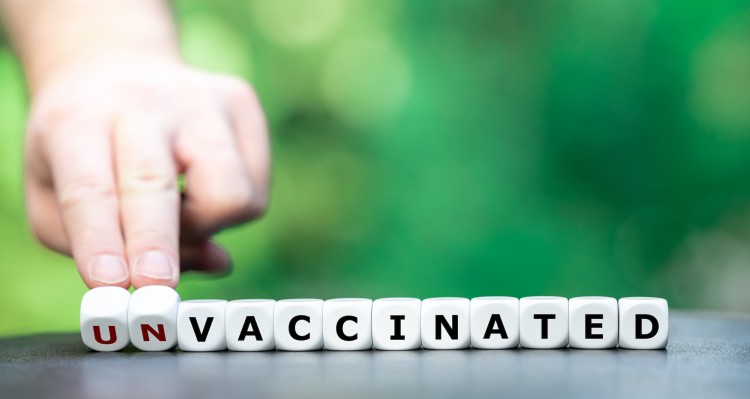CANADIAN IMMIGRATION UPDATES: Applicants to Master’s and Doctoral degrees are not affected by the recently announced cap on study permits. Read more

Blaming of unvaccinated during COVID-19 ignores risk profiles: UBC study

When COVID-19 vaccines first arrived, millions of people dutifully followed public health advice, lined up, rolled up their sleeves and got their shots. But another phenomenon was also taking shape: some refused the vaccine, and soon found themselves being blamed for putting others’ lives at risk and prolonging the pandemic — even when the evidence didn’t necessarily bear that out.
According to a new study from the UBC Sauder School of Business, they were experiencing a form of scapegoating — defined as “blaming an individual or a group of people who are not necessarily and solely responsible for an undesirable outcome” — and it turns out political ideology played a part.
Published in the BMJ Journal of Medical Ethics, the study shows the link between risk perception, political ideology and blame during the COVID-19 pandemic.
For the study, titled Blaming the unvaccinated during the COVID-19 pandemic: the roles of political ideology and risk perceptions in the USA, researchers created two low-risk fictional characters: a 21-year-old named Katy and 38-year-old Mark, whose risk of hospitalization or death was below one per cent; they were described as fit without major health conditions. They also introduced two high-risk characters: 78-year-old Mary who had no comorbidities, and 53-year-old Richard who had significant COVID risk factors. Their risks of hospitalization were below 20 per cent, and their risk of dying was below 10 per cent.
Participants in the study read all four character descriptions, and were told that each character was either fully vaccinated, unvaccinated, or unvaccinated but recovered from a past COVID-19 infection that occurred before vaccines were available.
They were then asked whether each character was at fault for COVID-19 hospitalizations and deaths, guilty of jeopardizing their community’s public health, or should be blamed for the effects of hospital staff shortages. They were also asked to estimate the likelihood the character would be hospitalized with severe illness, die, or not recover (a proxy for Long COVID).
The researchers found that people were more likely to blame the unvaccinated or unvaccinated-but-recovered characters, regardless of their risk profiles and regardless of their recovery status. Participants also consistently overestimated the chances that a low-risk character would be hospitalized, not recover or die, regardless of their vaccination status.
“Most people would probably say it’s not a good thing to scapegoat. But scapegoating is partly a function of people's perception of risk, and if they think terrible things are going to happen because of how other people are behaving, then they may feel more justified in scapegoating,” says UBC Sauder Professor Dr. Karl Aquino (he/him), who co-authored the study with Dr. Maja Graso of the University of Gronignen, Dr. Fan Xuan Chen of the University of Illinois Urbana-Champaign, and Dr. Kevin Bardosh of the University of Washington.
The findings also fell on opposite sides of the political divide: participants who reported voting for Donald Trump were less likely to scapegoat, no matter the character’s vaccination status, while participants who reported voting for Joe Biden were more likely to scapegoat the unvaccinated characters — including those who recovered from an infection before they had a chance to get the vaccine.
“Again, we find there's a relationship between the perception of risk and whether you scapegoat, and we found this liberal-conservative division. Conservatives are less willing to scapegoat the vaccinated and unvaccinated characters,” explains Dr. Aquino. “But liberals scapegoated the unvaccinated person who recovered from COVID more than the vaccinated one even though there is evidence that both can transmit the virus.”
For a second study, participants were asked to consider a 28-year-old low-risk male character who is fit, healthy, spends time outdoors and works by himself outside. Some were told he contracted COVID in May of 2021 (around the same time he was first eligible for the vaccine) and recovered fully, while others were told that he received two doses of the vaccine in May of 2021 but did not plan to get a booster.
Both characters had a low risk of becoming hospitalized and both posed a risk of transmission as their immunity had likely waned, but people — especially those with liberal leanings — were more likely to blame the unvaccinated character for overwhelming the healthcare system, endangering others and prolonging the pandemic.
Dr. Aquino, who regularly studies morality, emphasizes that the study isn’t making any moral judgements; rather, it’s meant to examine the forces behind people’s decision-making — and as in other areas, people are often motivated by what they want.
“If people want to ignore information to support their viewpoint, they can. And if they want to use to it support their viewpoint, they can. But morality is often driven by emotions, and when it comes down to it, people are not that rational,” says Dr. Aquino.
“They do what they want and what they feel like, and then after the fact they come up with reasons why it was the right thing to do,” he says, adding that people should think twice before judging others too harshly. “People can get stirred up in such an extreme way, especially about moral issues, and be oblivious to alternative ways of thinking about a situation,” he says. “So can be helpful to reminded of that.”
Stay in touch
Join our monthly newsletter and stay up-to-date on our innovative academic programs, world-leading faculty and research, and student and alumni achievements.